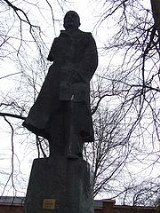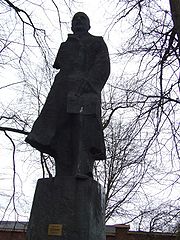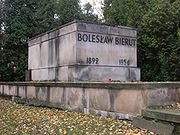
Boleslaw Bierut
Encyclopedia
Bolesław Bierut was a Polish
Communist leader, NKVD
agent, and a hard-line Stalinist
who became President of Poland after the Soviet takeover of the country in the aftermath of .
 Bierut was born in Rury Jezuickie, now a part of Lublin
Bierut was born in Rury Jezuickie, now a part of Lublin
, as the son of Henryk Rutkowski, a village teacher, and his wife Barbara Biernacka (Wojciech and Maria, according to IPN
source). He later adopted the surname "Bierut" combining the first syllables of his parents' surnames. In 1918 he took courses at the Warsaw School of Economics
, and in 1924–1930 went to Moscow
, to be trained at the school of the Communist International.
In 1930–1931 Bierut was sent by the Comintern
to Austria
, Czechoslovakia
and Bulgaria
. In 1933 he became an agent of Soviet
military intelligence, the GRU
, and subsequently, was sentenced in Poland to 10 years in prison for his anti-state activities (incarcerated between 1933–1938). The pro-Soviet Communist Party of Poland
was dissolved by Joseph Stalin
in 1938. Bierut was fortunate to avoid being caught in the Great Purge
, which led to the execution of most of the leaders of the Communist Party of Poland in the USSR. After an amnesty from the Polish government in 1938 Bierut settled down in Warsaw
and worked as a bookkeeper in a cooperative.
After the outbreak of World War II, Bierut fled to Eastern Poland (soon occupied by the Red Army
) in order to avoid military service. Bierut would spend part of the war in the USSR and was sent to head the new Polish Workers' Party
in 1943. He functioned as head of the Provisional National Council, a quasi-parliament (Krajowa Rada Narodowa), created by the pro-Soviet and Moscow-based Union of Polish Patriots, from 1944 to 1947.
Bierut played a leading role in the Soviet takeover of Poland and the installation there of a Stalinist regime. From 1947 to 1952, he served as President and then (after the abolition of the Presidency with the creation of the People's Republic of Poland
) Prime Minister. He was also the first Secretary General of the ruling Polish United Workers Party from 1948 to 1956.
Bierut oversaw the trials of many Polish wartime military leaders, such as General Stanisław Tatar and Brig. General Emil August Fieldorf
, as well as 40 members of the Wolność i Niezawisłość (Freedom and Independence) organisation, various Church officials and many other opponents of the new regime including the "hero of Auschwitz", Witold Pilecki
, condemned to death during secret trial
s. Bierut signed many of those death sentences.
 Bolesław Bierut died under mysterious circumstances in Moscow
Bolesław Bierut died under mysterious circumstances in Moscow
in 1956 during a visit to the Soviet Union, shortly after attending the 20th Congress of the Communist Party of the Soviet Union during which Nikita Khrushchev
delivered his "Secret Speech", denouncing the Stalin's cult of personality
and dictatorship
.
Bierut's death, which gave rise to much speculation about poison
ing or a suicide
, symbolically marked the end of the era of Stalinism
in Poland.
agent) posing as Bierut since 1943 with his full knowledge. Wieczorkiewicz referred to an account of Piotr Jaroszewicz made soon before his death, and published by Bohdan Roliński. The Polish President's double was shot dead by an unidentified assassin – likely another agent wearing an NKVD uniform and killed at the scene – at the Hotel Francuski in Kraków
, Poland in 1947. The real "Bierut" showed up half an hour later and calmed the security according to statement made by one of them. The assassination attempt was kept secret by the authorities. Wieczorkiewicz himself referred to this theory as an urban legend.
Poland
Poland , officially the Republic of Poland , is a country in Central Europe bordered by Germany to the west; the Czech Republic and Slovakia to the south; Ukraine, Belarus and Lithuania to the east; and the Baltic Sea and Kaliningrad Oblast, a Russian exclave, to the north...
Communist leader, NKVD
NKVD
The People's Commissariat for Internal Affairs was the public and secret police organization of the Soviet Union that directly executed the rule of power of the Soviets, including political repression, during the era of Joseph Stalin....
agent, and a hard-line Stalinist
Stalinism
Stalinism refers to the ideology that Joseph Stalin conceived and implemented in the Soviet Union, and is generally considered a branch of Marxist–Leninist ideology but considered by some historians to be a significant deviation from this philosophy...
who became President of Poland after the Soviet takeover of the country in the aftermath of .
Life

Lublin
Lublin is the ninth largest city in Poland. It is the capital of Lublin Voivodeship with a population of 350,392 . Lublin is also the largest Polish city east of the Vistula river...
, as the son of Henryk Rutkowski, a village teacher, and his wife Barbara Biernacka (Wojciech and Maria, according to IPN
Institute of National Remembrance
Institute of National Remembrance — Commission for the Prosecution of Crimes against the Polish Nation is a Polish government-affiliated research institute with lustration prerogatives and prosecution powers founded by specific legislation. It specialises in the legal and historical sciences and...
source). He later adopted the surname "Bierut" combining the first syllables of his parents' surnames. In 1918 he took courses at the Warsaw School of Economics
Warsaw School of Economics
Warsaw School of Economics is the oldest economic university in Poland.The Warsaw School of Economics was founded in 1906 as a private school under the name August Zieliński Private Trade Courses for Men. On 30 July 1919 it became a separate legal entity and was granted the status of an...
, and in 1924–1930 went to Moscow
Moscow
Moscow is the capital, the most populous city, and the most populous federal subject of Russia. The city is a major political, economic, cultural, scientific, religious, financial, educational, and transportation centre of Russia and the continent...
, to be trained at the school of the Communist International.
In 1930–1931 Bierut was sent by the Comintern
Comintern
The Communist International, abbreviated as Comintern, also known as the Third International, was an international communist organization initiated in Moscow during March 1919...
to Austria
Austria
Austria , officially the Republic of Austria , is a landlocked country of roughly 8.4 million people in Central Europe. It is bordered by the Czech Republic and Germany to the north, Slovakia and Hungary to the east, Slovenia and Italy to the south, and Switzerland and Liechtenstein to the...
, Czechoslovakia
Czechoslovakia
Czechoslovakia or Czecho-Slovakia was a sovereign state in Central Europe which existed from October 1918, when it declared its independence from the Austro-Hungarian Empire, until 1992...
and Bulgaria
Bulgaria
Bulgaria , officially the Republic of Bulgaria , is a parliamentary democracy within a unitary constitutional republic in Southeast Europe. The country borders Romania to the north, Serbia and Macedonia to the west, Greece and Turkey to the south, as well as the Black Sea to the east...
. In 1933 he became an agent of Soviet
Soviet Union
The Soviet Union , officially the Union of Soviet Socialist Republics , was a constitutionally socialist state that existed in Eurasia between 1922 and 1991....
military intelligence, the GRU
GRU
GRU or Glavnoye Razvedyvatel'noye Upravleniye is the foreign military intelligence directorate of the General Staff of the Armed Forces of the Russian Federation...
, and subsequently, was sentenced in Poland to 10 years in prison for his anti-state activities (incarcerated between 1933–1938). The pro-Soviet Communist Party of Poland
Communist Party of Poland
The Communist Party of Poland is a historical communist party in Poland. It was a result of the fusion of Social Democracy of the Kingdom of Poland and Lithuania and the Polish Socialist Party-Left in the Communist Workers Party of Poland .-1918-1921:The KPRP was founded on 16 December 1918 as...
was dissolved by Joseph Stalin
Joseph Stalin
Joseph Vissarionovich Stalin was the Premier of the Soviet Union from 6 May 1941 to 5 March 1953. He was among the Bolshevik revolutionaries who brought about the October Revolution and had held the position of first General Secretary of the Communist Party of the Soviet Union's Central Committee...
in 1938. Bierut was fortunate to avoid being caught in the Great Purge
Great Purge
The Great Purge was a series of campaigns of political repression and persecution in the Soviet Union orchestrated by Joseph Stalin from 1936 to 1938...
, which led to the execution of most of the leaders of the Communist Party of Poland in the USSR. After an amnesty from the Polish government in 1938 Bierut settled down in Warsaw
Warsaw
Warsaw is the capital and largest city of Poland. It is located on the Vistula River, roughly from the Baltic Sea and from the Carpathian Mountains. Its population in 2010 was estimated at 1,716,855 residents with a greater metropolitan area of 2,631,902 residents, making Warsaw the 10th most...
and worked as a bookkeeper in a cooperative.
After the outbreak of World War II, Bierut fled to Eastern Poland (soon occupied by the Red Army
Red Army
The Workers' and Peasants' Red Army started out as the Soviet Union's revolutionary communist combat groups during the Russian Civil War of 1918-1922. It grew into the national army of the Soviet Union. By the 1930s the Red Army was among the largest armies in history.The "Red Army" name refers to...
) in order to avoid military service. Bierut would spend part of the war in the USSR and was sent to head the new Polish Workers' Party
Polish Workers' Party
The Polish Workers' Party was a communist party in Poland from 1942 to 1948. It was founded as a reconstitution of the Communist Party of Poland, and merged with the Polish Socialist Party in 1948 to form the Polish United Workers' Party.-History:...
in 1943. He functioned as head of the Provisional National Council, a quasi-parliament (Krajowa Rada Narodowa), created by the pro-Soviet and Moscow-based Union of Polish Patriots, from 1944 to 1947.
Bierut played a leading role in the Soviet takeover of Poland and the installation there of a Stalinist regime. From 1947 to 1952, he served as President and then (after the abolition of the Presidency with the creation of the People's Republic of Poland
People's Republic of Poland
The People's Republic of Poland was the official name of Poland from 1952 to 1990. Although the Soviet Union took control of the country immediately after the liberation from Nazi Germany in 1944, the name of the state was not changed until eight years later...
) Prime Minister. He was also the first Secretary General of the ruling Polish United Workers Party from 1948 to 1956.
Bierut oversaw the trials of many Polish wartime military leaders, such as General Stanisław Tatar and Brig. General Emil August Fieldorf
Emil August Fieldorf
Emil August Fieldorf was a Polish Brigadier General. He was Deputy Commander-in-Chief of the Home Army or AK, after the failure of the Warsaw Uprising...
, as well as 40 members of the Wolność i Niezawisłość (Freedom and Independence) organisation, various Church officials and many other opponents of the new regime including the "hero of Auschwitz", Witold Pilecki
Witold Pilecki
Witold Pilecki was a soldier of the Second Polish Republic, the founder of the Secret Polish Army resistance group and a member of the Home Army...
, condemned to death during secret trial
Secret trial
A secret trial is a trial that is not open to the public, nor generally reported in the news, especially any in-trial proceedings. Generally no official record of the case or the judge's verdict is made available. Often there is no indictment...
s. Bierut signed many of those death sentences.
Death

Moscow
Moscow is the capital, the most populous city, and the most populous federal subject of Russia. The city is a major political, economic, cultural, scientific, religious, financial, educational, and transportation centre of Russia and the continent...
in 1956 during a visit to the Soviet Union, shortly after attending the 20th Congress of the Communist Party of the Soviet Union during which Nikita Khrushchev
Nikita Khrushchev
Nikita Sergeyevich Khrushchev led the Soviet Union during part of the Cold War. He served as First Secretary of the Communist Party of the Soviet Union from 1953 to 1964, and as Chairman of the Council of Ministers, or Premier, from 1958 to 1964...
delivered his "Secret Speech", denouncing the Stalin's cult of personality
Cult of personality
A cult of personality arises when an individual uses mass media, propaganda, or other methods, to create an idealized and heroic public image, often through unquestioning flattery and praise. Cults of personality are usually associated with dictatorships...
and dictatorship
Dictatorship
A dictatorship is defined as an autocratic form of government in which the government is ruled by an individual, the dictator. It has three possible meanings:...
.
Bierut's death, which gave rise to much speculation about poison
Poison
In the context of biology, poisons are substances that can cause disturbances to organisms, usually by chemical reaction or other activity on the molecular scale, when a sufficient quantity is absorbed by an organism....
ing or a suicide
Suicide
Suicide is the act of intentionally causing one's own death. Suicide is often committed out of despair or attributed to some underlying mental disorder, such as depression, bipolar disorder, schizophrenia, alcoholism, or drug abuse...
, symbolically marked the end of the era of Stalinism
Stalinism
Stalinism refers to the ideology that Joseph Stalin conceived and implemented in the Soviet Union, and is generally considered a branch of Marxist–Leninist ideology but considered by some historians to be a significant deviation from this philosophy...
in Poland.
Speculations about identity
The late Polish historian Paweł Wieczorkiewicz argued in recent times that Bolesław Bierut might have had a Soviet-sent double (an NKVDNKVD
The People's Commissariat for Internal Affairs was the public and secret police organization of the Soviet Union that directly executed the rule of power of the Soviets, including political repression, during the era of Joseph Stalin....
agent) posing as Bierut since 1943 with his full knowledge. Wieczorkiewicz referred to an account of Piotr Jaroszewicz made soon before his death, and published by Bohdan Roliński. The Polish President's double was shot dead by an unidentified assassin – likely another agent wearing an NKVD uniform and killed at the scene – at the Hotel Francuski in Kraków
Kraków
Kraków also Krakow, or Cracow , is the second largest and one of the oldest cities in Poland. Situated on the Vistula River in the Lesser Poland region, the city dates back to the 7th century. Kraków has traditionally been one of the leading centres of Polish academic, cultural, and artistic life...
, Poland in 1947. The real "Bierut" showed up half an hour later and calmed the security according to statement made by one of them. The assassination attempt was kept secret by the authorities. Wieczorkiewicz himself referred to this theory as an urban legend.

